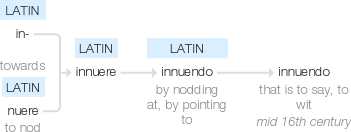Innuendo
mid 16th century (as an adverb in the sense ‘that is to say, to wit’, used in legal documents to introduce an explanation): Latin, ‘by nodding at, by pointing to’, ablative gerund of innuere, from in- ‘towards’ + nuere ‘to nod’. The noun dates from the late 17th century.
wiktionary
From the Latin innuendō(“by nodding”), ablative singular form of innuendum(“a nodding”), gerund of innuō(“I give a nod”).
etymonline
innuendo (n.)
"oblique hint, indiscreet suggestion," usually a deprecatory one, 1670s, from Latin innuendo "by meaning, pointing to," literally "giving a nod to," ablative of gerund of innuere "to mean, signify," literally "to nod to," from in- "at" (from PIE root *en "in") + nuere "to nod" (see numinous).
Originally in English a legal phrase (1560s) from Medieval Latin, with the sense of "to wit," introducing an explanatory or parenthetical clause, it also introduced the derogatory meaning alleged in libel cases, which led to broader meaning. As a verb, from 1706.
